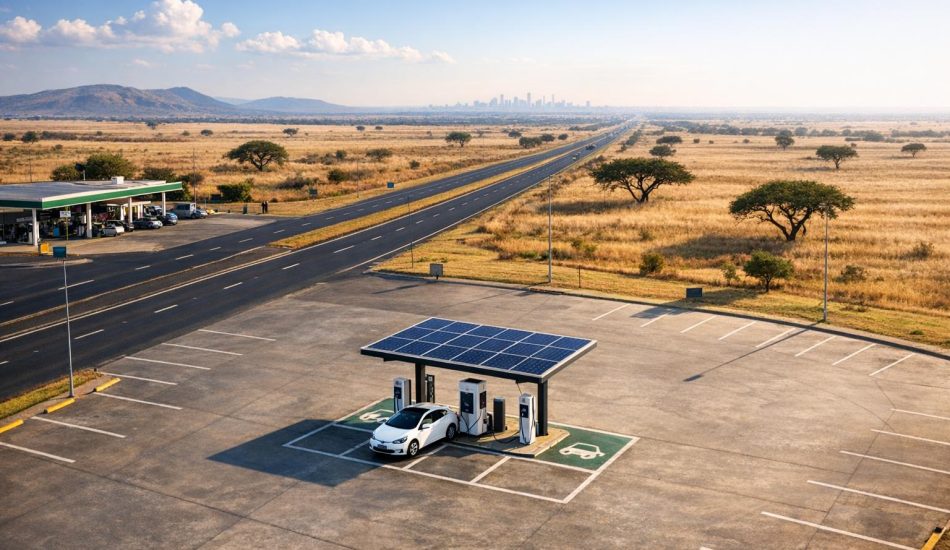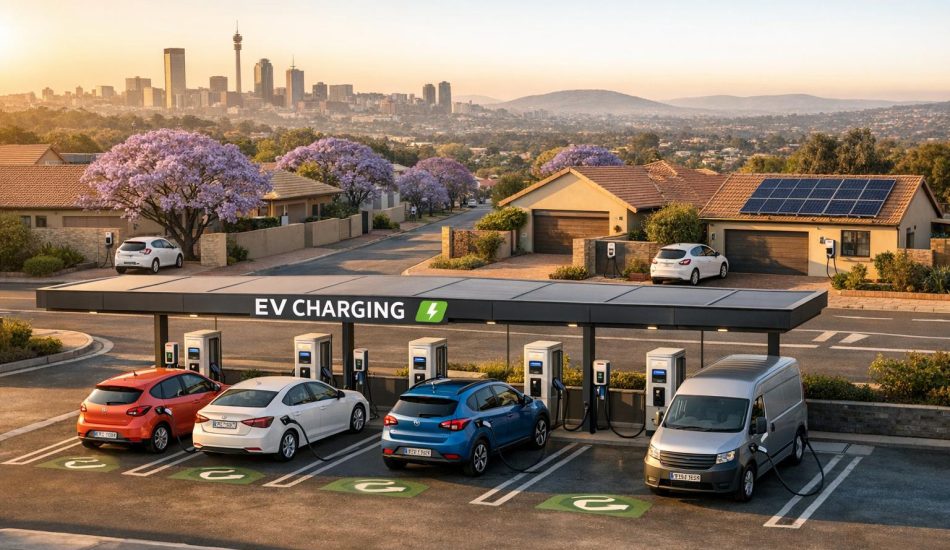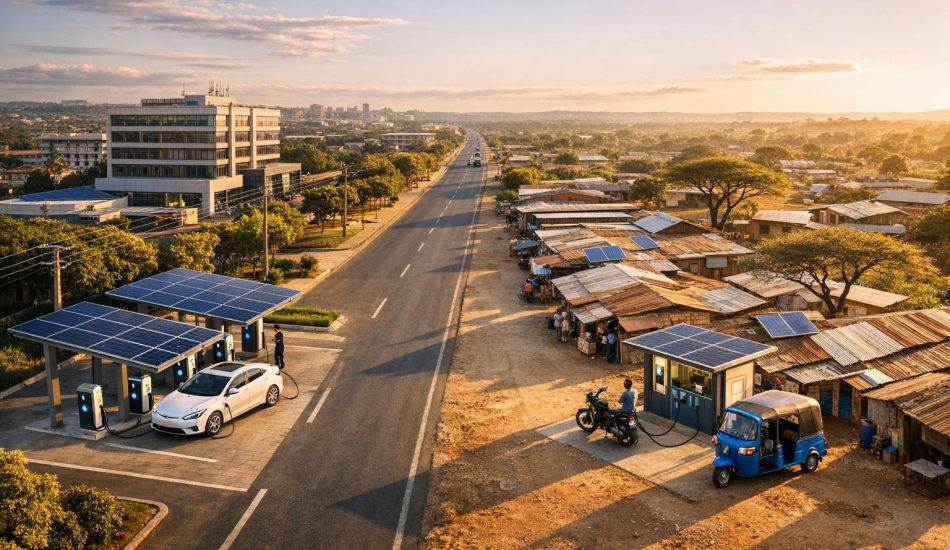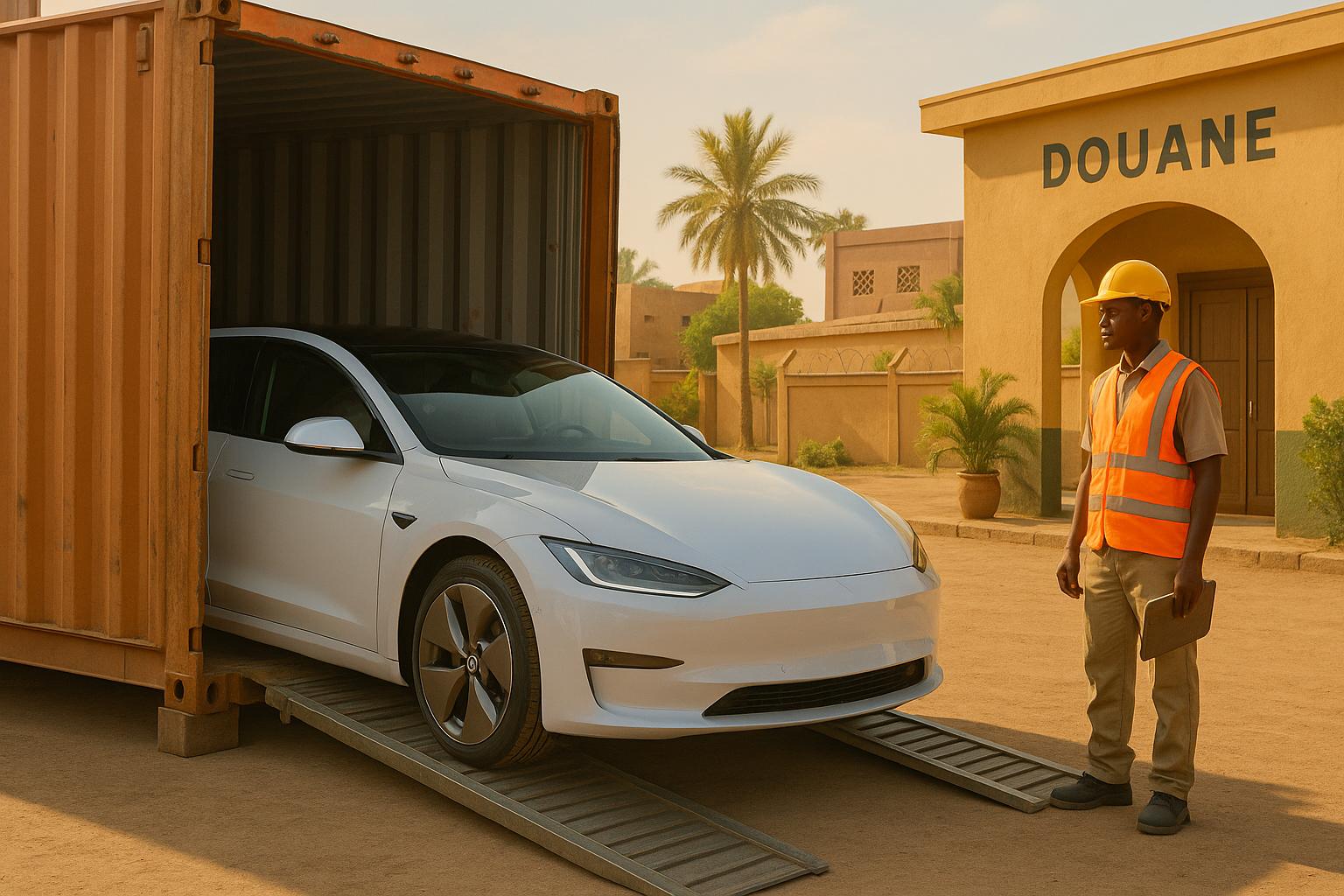
Importing an electric vehicle (EV) to Burkina Faso in 2025 involves understanding regulations, choosing the right car, managing costs, and handling logistics. Here’s a quick overview of the process:
- Understand Import Rules: Burkina Faso follows Euro IV standards, and EVs automatically comply. Cars over 10 years old incur extra taxes.
- Choose the Right EV: Opt for newer models designed for durability in high temperatures and rough terrains. Chinese EVs and Teslas are popular options.
- Calculate Costs: Import duties (10%) and VAT (12.5%) apply, along with shipping and processing fees. Costs can total up to 50% of the vehicle’s value.
- Find Reliable Suppliers: Use platforms like EV24.africa to source verified EVs and avoid scams.
- Arrange Shipping: Choose between RoRo or container shipping, considering safety and cost. Most cars arrive via ports in Ghana or Côte d’Ivoire.
- Clear Customs: Prepare all required documents, including battery safety certifications, and pay fees.
- Register and Insure: Complete registration and secure EV-specific insurance to drive legally.
How to Import an Electric Vehicle to Jamaica
Step 1: Learn Burkina Faso‘s 2025 Electric Vehicle Import Rules
Before shipping your electric vehicle (EV) to Burkina Faso, it’s crucial to understand the country’s import regulations. These rules differ from those for standard vehicles, and overlooking any requirements could lead to costly delays or even rejection at customs. Below, we’ll break down the essential steps and documents you’ll need to ensure a smooth import process.
Burkina Faso adheres to Euro IV emission standards, a policy adopted by the Economic Community of West African States (ECOWAS) in 2021. For EV importers, this is good news – electric vehicles automatically meet these standards thanks to their zero tailpipe emissions. However, you’ll still need to provide documentation verifying your vehicle’s specifications.
While there are no age restrictions for importing EVs, older vehicles come with higher costs. Cars older than 10 years are subject to additional taxes and duties. If your EV is under 10 years old, it’s a good idea to include a third-party residual value report to avoid fines.
Required Documents
Importing an EV into Burkina Faso involves more paperwork than traditional vehicles due to specific battery safety requirements. Here’s what you’ll need:
- Electronic Cargo Tracking Note (ECTN): This document is mandatory for all imports and costs $275 per vehicle.
- Material Safety Data Sheet (MSDS): Since EVs are classified as IMO hazardous material due to their lithium-ion batteries, the MSDS is required to confirm battery safety parameters.
- Vehicle Labeling: Ensure the VIN is clearly visible on the front windshield, along with a label indicating whether the vehicle is fully electric, hybrid, or plug-in hybrid.
- Condition Confirmation: Verify that the battery is intact and leak-free before shipping.
| Document | Purpose/Requirement | Source |
|---|---|---|
| Burkina Faso Vehicle Control Center (CCVA) assessment reports | Prevents cargo detention |
For vehicles valued above FCFA 1,000,000 (about $1,565), a pre-shipment inspection by COTECNA is mandatory. This verification process is required for most EVs, so it’s important to plan accordingly.
Other essential documents include the original vehicle title (showing no lien holder), a commercial invoice with a zero balance, the original bill of lading, your passport, a driver’s license issued in Burkina Faso or an International Driver’s ID, and detailed vehicle specifications (year, make, model, VIN, weight, and dimensions).
Meeting Local Standards
Your EV must meet Burkina Faso’s technical and safety standards before it can be cleared through customs. You’ll need to provide proof of Euro IV compliance. If your EV is Chinese-made and meets National IV standards, it will likely qualify without additional modifications.
Stay in touch with customs authorities to track any changes to ECOWAS emission standards. Being proactive can help you avoid unexpected compliance issues. Additionally, notify both your car transporter and Burkina Faso Customs in advance about the EV import. This ensures proper handling and minimizes delays during clearance.
Finally, double-check all your documents before shipping. Missing paperwork can cause your vehicle to be held at customs, leading to storage fees and extended wait times. Once you’ve confirmed everything is in order, you’ll be ready to move on to selecting the best EV for import.
Step 2: Pick the Right Electric Vehicle to Import
Electric vehicle imports are steadily increasing in Burkina Faso. Choosing the right EV for the country means taking into account its unique challenges – high temperatures, rough terrain, and limited charging infrastructure. You’ll need a vehicle that can handle these conditions while staying within your budget and meeting range expectations. Additionally, Burkina Faso has strict import regulations: vehicles older than 10 years are not allowed, and all imports must meet Euro IV emission standards. With these factors in mind, let’s explore which types of vehicles are best suited for the local environment.
Best Vehicle Types for Import
To ensure a smooth import process, focus on vehicles that align with Burkina Faso’s environmental and operational needs. Chinese-made EVs are a particularly good fit for the country. These vehicles are designed with the African market in mind, offering features like high-temperature adaptive control systems and corrosion-resistant bodies that perform well in harsh climates.
For example, BAIC Foton’s buses, tailored for African conditions, boast a 15%–20% lower failure rate compared to similar European models. Similarly, Chinese high-floor SUVs with ground clearance between 180–220 mm (7.1–8.7 inches) are excellent for navigating the country’s rugged rural roads.
Since Burkina Faso enforces Euro IV emission standards, which align with China’s National IV requirements, newer Chinese vehicles automatically meet these regulations. This simplifies compliance during customs clearance.
Tesla models are another popular choice, especially for urban areas like Ouagadougou, where charging stations are more readily available. For specific vehicle categories, consider 10–12 meter city buses for commercial use or high-floor SUVs with a minimum range of 400 km (about 250 miles) for rural areas. These options are well-suited to the country’s infrastructure and operational challenges.
Support for Chinese EVs is also growing, with over 50 local technicians in Burkina Faso certified to repair Chinese new energy vehicles as of Q3 2025. This ensures better after-sales service in the capital and other major cities, making these vehicles a practical and reliable choice.
Used vs. New Electric Cars
New electric vehicles are highly recommended for import into Burkina Faso, especially given the country’s restrictions on vehicles older than 10 years.
While used EVs might seem like a cost-effective option, they often come with degraded batteries that significantly reduce range and performance – issues that are exacerbated by Burkina Faso’s high temperatures. New vehicles, on the other hand, typically include advanced battery thermal management systems to prevent overheating in such conditions.
Another advantage of new EVs is warranty coverage. Most manufacturers offer warranties of 8 years or 100,000 miles for batteries, which is critical since battery replacement can be very expensive. Additionally, new vehicles come with complete documentation, a clear title history, and proper certification, making the customs clearance process much smoother. In contrast, used vehicles often have incomplete records or uncertain maintenance histories, which can lead to delays.
If you’re purchasing a new EV, consider going for "car purchase + PV charging packages." These bundles pair your EV with a home solar charging system, tapping into Burkina Faso’s abundant sunshine – over 3,000 hours annually – and leveraging PV system costs as low as $0.08 per kWh. This solution not only addresses the country’s limited grid coverage (less than 40%) but also promotes energy independence.
Chinese companies like Hangzhou Aoneng are also contributing to this effort by donating 30 EV charging stations to Burkina Faso and planning to build small photovoltaic power stations. These initiatives aim to create a seamless system for solar power generation, energy storage, and EV charging.
Once you’ve chosen the right EV, the next step is understanding the financial aspects of importing it into Burkina Faso.
Step 3: Calculate Import Duties and Taxes
When planning to import an electric vehicle to Burkina Faso, it’s crucial to account for all related expenses. Beyond the purchase price of the car, you’ll encounter various fees and taxes that can significantly affect your total costs. Having a clear estimate of these charges beforehand allows for better budgeting and helps you avoid unexpected expenses during customs clearance.
2025 Import Duty Rates for Electric Cars
As of 2025, Burkina Faso imposes a 10% import duty and a 12.5% VAT on all imported vehicles, including electric cars. These percentages are applied to the vehicle’s declared value. For example, if the declared value of a new electric vehicle is US$25,000, you would pay US$2,500 in import duty and US$3,125 in VAT, bringing the total to US$5,625 before factoring in additional fees.
There’s a possibility for reduced rates under Burkina Faso’s renewable energy equipment policy. The country offers zero or low tariffs on items like solar panels and wind turbines to encourage the use of sustainable energy sources. While electric cars aren’t explicitly listed under this policy, they may be eligible under broader renewable energy initiatives. To confirm whether your electric vehicle qualifies for these reduced rates, reach out to Burkina Faso customs authorities or consult a local import specialist.
These calculations form the basis for understanding the overall cost of importing an electric vehicle.
Additional Fees and Costs
On top of duties and VAT, administrative and processing fees typically range from US$1,500 to US$2,500 per vehicle. Additionally, you’ll need to obtain an Electronic Cargo Tracking Note (ECTN), which costs US$275 per vehicle.
For the latest details on import taxes and potential exemptions, it’s a good idea to contact the Burkina Faso Embassy in Belgium or Washington, DC.
To get a full picture of the total cost, add up the vehicle price, shipping fees, import duties, VAT, local administrative charges, the ECTN fee, and any other applicable expenses. This thorough calculation will ensure you’re financially prepared and allow you to compare the true cost of importing an electric vehicle to Burkina Faso.
Step 4: Find Reliable Electric Vehicle Suppliers
When importing an electric vehicle to Burkina Faso, finding a dependable supplier is absolutely crucial. The rise in demand for electric cars has brought a mix of legitimate dealers and scam operators eager to take advantage of buyers. Conducting thorough research can save you from losing money and unnecessary stress.
Since supplier information changes frequently, it’s essential to rely on up-to-date data when evaluating any dealer. This makes verifying credentials and ensuring the supplier is actively operational a top priority. A trustworthy platform with verified data can simplify the process of sourcing quality vehicles.
Using EV24.africa for Vehicle Sourcing
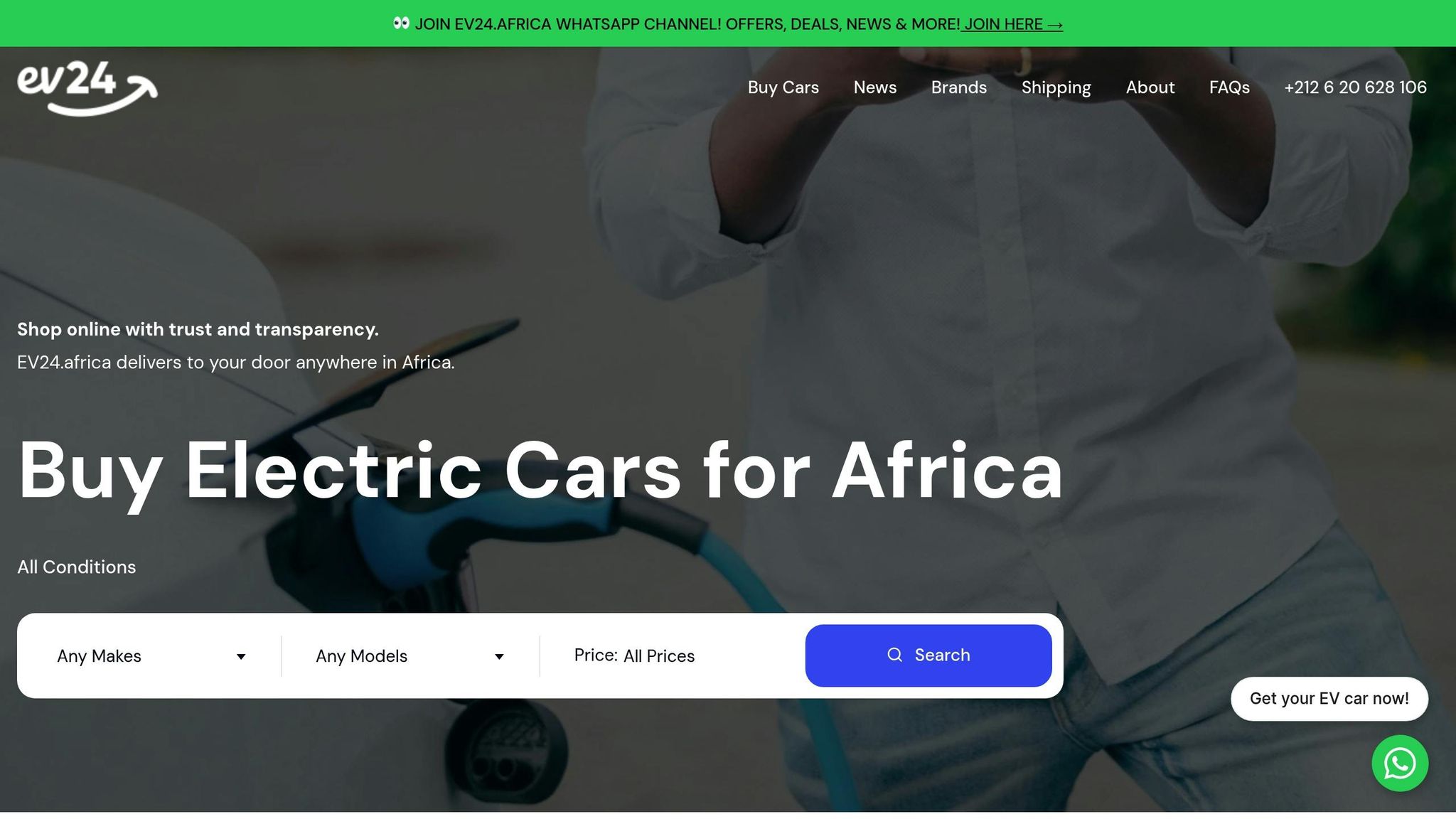
EV24.africa is an excellent platform for finding both new and used electric vehicles. It provides detailed specifications and transparent pricing for models from well-known brands like Tesla, BYD, Leapmotor, Hyundai, Toyota, and Suzuki.
The platform offers detailed listings, including specifications, pricing, and, when available, vehicle history reports. What sets EV24.africa apart is its dealer verification system, which ensures that every seller undergoes a rigorous review before listing vehicles. By choosing a verified dealer, you not only reduce the risk of fraud but also simplify the shipping and customs processes that follow.
How to Avoid Fraudulent Dealers
Steering clear of fraudulent dealers requires careful verification and attention to detail. Be cautious of unsolicited offers that promise unrealistically low prices or quick approvals without proper documentation. Always start by thoroughly researching potential suppliers and cross-checking their contact information (phone numbers, email addresses, and websites) for consistency.
Ask for customer references or case studies from previous buyers. Reputable dealers should have no trouble providing testimonials or proof of successful transactions. Additionally, confirm that the supplier holds valid industry certifications and business licenses – these are strong indicators of their credibility.
Pay attention to how the supplier communicates. Legitimate dealers are typically knowledgeable about their vehicles and willing to answer detailed questions about their offerings and processes. Avoid sellers who pressure you into making hasty decisions or refuse to provide proper documentation.
"If the deal is legitimate, it will still be there tomorrow." – Paul Mankin
If something feels off, trust your instincts and walk away.
sbb-itb-99e19e3
Step 5: Arrange Shipping and Delivery
Once you’ve secured a supplier, the next step is planning how to transport your EV to Burkina Faso. Since lithium-ion batteries are considered hazardous, it’s essential to follow all safety protocols and complete the necessary paperwork to ensure smooth shipping.
Picking a Shipping Method
There are three main shipping methods to consider for your electric vehicle (EV):
Roll-on/Roll-off (RoRo) Shipping
RoRo shipping is often the most budget-friendly option for vehicles that are operational. Your EV is driven directly onto the ship and secured in the cargo area. For instance, shipping from ports like Baltimore or Newark costs around $2,192 for vehicles up to 650 cubic feet, with transit times as short as 17–18 days to Ouagadougou. However, many international ports now restrict EVs on RoRo vessels due to safety concerns with lithium batteries. This makes container shipping a safer and, in many cases, the only viable choice.
"Container shipping is the safest and only compliant option for transporting EVs overseas." – Royal Shipping Lines
Full Container Load (FCL) Shipping
Container shipping offers maximum safety for your EV, especially when transporting hazardous lithium batteries. A 20-foot container starts at about $4,850, while a 40-foot container costs around $6,850. The larger option can fit 3–4 vehicles, making it more economical if you’re shipping multiple cars or additional cargo.
Shared Container (LCL) Shipping
Shared container shipping is a more affordable alternative, starting at roughly $4,850. However, it comes with less predictable schedules since the container must be filled with other cargo before departure. This option works well for non-operational vehicles or when delivery timing isn’t critical.
| Shipping Method | Cost Range | Transit Time | Best For | EV Compatibility |
|---|---|---|---|---|
| RoRo Service | $2,192+ | 17–25 days | Operational vehicles, cost-conscious | Limited due to port restrictions |
| Full Container (20ft) | $4,850+ | 20–30 days | Single EV, maximum protection | Recommended |
| Full Container (40ft) | $6,850+ | 20–30 days | Multiple vehicles, additional cargo | Best for bulk shipping |
| Shared Container | $4,850+ | Variable | Budget-friendly, flexible timelines | Suitable for non-operational EVs |
Once you’ve chosen a shipping method, the next focus is on delivery logistics.
Managing Delivery to Burkina Faso
After finalizing your shipping choice, partner with a reliable carrier experienced in shipping to West Africa. Well-known carriers like Grimaldi Lines, ACL RoRo, Sallaum Lines, and Wallenius Wilhelmsen are familiar with the complexities of shipping to landlocked destinations like Burkina Faso. Most shipments are routed through Ghana’s Port of Tema, followed by overland transport.
Proper preparation of your EV is critical. Charge the battery to 50–70% and follow the shipping agent’s instructions for disconnecting high-voltage circuits for safety. Lithium batteries require additional documentation, such as a Dangerous Goods Declaration (DGD) and a Container Packing Certificate. Be sure your chosen carrier has experience handling EV shipments.
Given the high value of electric vehicles, comprehensive insurance coverage is a must. Standard carrier liability is often limited, so it’s wise to invest in full marine cargo insurance that specifically covers battery damage. Coverage of at least $1 million is recommended, though $2 million is ideal for premium EVs.
Before shipping, clean the vehicle thoroughly to meet biosecurity requirements and remove any personal items, as they are not covered by transit insurance and could add unnecessary weight. Document the car’s condition with detailed, time-stamped photos. These records can be invaluable if you need to file an insurance claim.
Shipping times vary depending on your port of departure. For example, Baltimore offers one of the quickest routes at 18 days, while shipments from West Coast ports like Los Angeles can take up to 45 days. Be sure to factor these timelines into your planning, especially if there’s a specific date by which you need the vehicle.
Organizing shipping and delivery is a crucial step toward completing the import process. Remember, shipping costs are just one piece of the puzzle. When budgeting, also account for import duties, the Electronic Cargo Tracking Note (ECTN) fee, and local handling charges in Burkina Faso.
Step 6: Clear Customs and Pay Required Fees
Once your EV arrives, it must go through customs for inspections, document verification, and fee payments. Being well-prepared can save time and help you avoid unnecessary delays.
Getting Ready for Customs Inspection
Customs officials will inspect your EV to ensure it meets Burkina Faso’s import standards, both in terms of physical condition and compliance with regulations.
Physical Vehicle Inspection
Your EV should arrive in excellent condition to pass the customs inspection. The undercarriage must be free of dirt, microorganisms, and organic residues to meet international shipping standards. Additionally, the interior should be clean and free of personal belongings to avoid any complications during the clearance process.
Electric Vehicle-Specific Requirements
Customs will also examine documents specific to electric vehicles. Ensure the Material Safety Data Sheet (MSDS) for the battery is up-to-date and readily available. A label must be affixed to the front windshield, clearly displaying the vehicle’s VIN and propulsion type (e.g., fully electric, hybrid, plug-in hybrid, CNG, LNG) [4,17].
Assessment and Compliance Checks
All vehicles, including EVs, must pass assessments conducted by the Burkina Faso Vehicle Control Center (CCVA). For cars less than 10 years old, providing a residual value assessment report from a third-party inspection agency can establish the vehicle’s market value for duty calculations and help avoid penalties. Once your EV clears these checks, you can proceed to pay the required duties and fees.
Paying Import Duties and Fees
After your vehicle passes inspection, you’ll need to settle all duties, taxes, and fees before taking possession of the car. These costs are broken into duty, tax, and administrative charges.
Understanding the Fee Structure
Duties and taxes are calculated using the CIF (Cost, Insurance, and Freight) method, which considers the vehicle’s value, shipping costs, and insurance. Importantly, there is no minimum threshold – fees apply from the very first dollar of value [48,49].
Mandatory Document Fees
The ECTN (Electronic Cargo Tracking Note) is a required fee of $275 per vehicle, regardless of the vehicle’s value [4,17,5].
Required Documentation for Payment
To complete the payment process, you’ll need the following documents:
- Original Certificate of Title and Registration (or state title)
- Original Commercial/Purchase Invoice or Bill of Sale
- Rated Original Bill of Lading (or Seaway Bill/Airway Bill)
- Your Original Passport
- Valid Driver’s License (Burkina Faso or International) and an International Insurance Policy (green card)
- Completed Burkina Faso Customs Form C
- Pier Fees Document for the Ouagadougou terminal
These documents are essential for ensuring a smooth payment and customs clearance process [4,5,6,17].
Transit Considerations
If your vehicle is passing through Abidjan, Côte d’Ivoire, make sure the bill of lading, shipping documents, and packaging are clearly marked with "Ivory Coast transit." This designation can exempt your vehicle from taxes in Côte d’Ivoire, reducing overall costs.
Payment Processing
Once all documents are verified, you can proceed with payment. Double-check for accuracy to avoid delays or penalties. Keep in mind that payment processing might take several days, particularly if discrepancies arise or additional inspections are required. Building extra time into your shipping schedule is a smart move.
After completing customs clearance and paying all fees, the next step is to register and insure your EV in Burkina Faso.
Step 7: Register and Insure Your Electric Vehicle in Burkina Faso
Once you’ve cleared customs and paid all necessary fees, you’re ready to take the final steps to legally drive your imported electric vehicle (EV) in Burkina Faso. This involves registering your EV and securing the required insurance coverage.
Vehicle Registration Process
Before registering your EV, it must pass a Detailed Physical Inspection (DPI) to confirm it meets Burkina Faso’s safety and technical standards. Make sure the Vehicle Identification Number (VIN) sticker is properly affixed, as this is a key requirement established during customs clearance.
Afterward, head to a local police or gendarmerie station with your import documents, which should include customs clearance papers, purchase invoices, and shipping records. Officials will review these documents along with your DPI certificate at the registration office. Once everything checks out, you’ll be issued official license plates.
In Burkina Faso, vehicles must display license plates on both the front and rear. These plates are sold exclusively by licensed dealers and adhere to specific government standards. For instance, private passenger cars typically have plates with a white background and black lettering, while commercial plates feature a blue background with white text. The first digits on the plate indicate the province where the vehicle is registered. To enhance security and combat fraud, a digital platform (www.dgttmverif.bf) is available for verifying both provisional and permanent registrations.
Once your EV is registered, the next step is to secure the mandatory insurance coverage.
Getting Insurance Coverage
Insurance is a legal requirement for all vehicles in Burkina Faso, and EV-specific policies reflect the unique needs of these vehicles. As of 2025, the average annual insurance cost for an EV is about $2,280. This higher rate is due to the vehicle’s value and specialized repair costs, such as battery replacements, which can range from $5,000 to $16,000. For comparison, gas-powered cars average $1,529 per year in insurance, while hybrids cost around $1,637 annually. The battery pack, which can make up 30–50% of an EV’s total value, is a major factor in these costs.
When selecting an insurance policy, ensure it includes the essential coverage types:
- Liability coverage: Protects against damages or injuries caused to others.
- Collision coverage: Covers damage to your EV in the event of an accident.
- Comprehensive coverage: Protects against non-collision incidents like theft, fire, or storm damage.
Additionally, you may want to explore EV-specific options such as:
- Coverage for battery replacement or degradation.
- Protection for charging cables and connectors.
- Insurance for home charging stations, if applicable.
To save on insurance costs, consider comparing quotes from multiple providers. Look for discounts tied to factors like low mileage, advanced safety features, secure parking, bundling policies, or paying premiums upfront. You can also lower premiums by increasing your deductible or enrolling in telematics programs that reward safe driving. Regularly reviewing your policy with your insurer ensures you maintain the right coverage while taking advantage of potential savings.
With your EV registered and insured, you’re ready to hit the road legally in Burkina Faso.
Conclusion: Key Points for a Smooth Import Process
Bringing an electric vehicle into Burkina Faso takes careful planning, but following these seven steps can help you navigate the process effectively. Be prepared for total import costs that might amount to as much as 50% of your vehicle’s value. This includes a 10% import duty, 12.5% VAT, additional fees ranging from $1,500 to $2,500, and a $275 ECTN fee.
Keep in mind that vehicles older than 10 years come with extra taxes and duties, so choosing a newer model could save you money in the long run.
When deciding on a shipping method, weigh the trade-offs between cost and safety. RoRo shipping is a more affordable choice, but container shipping offers better protection for your vehicle. Most car imports to Burkina Faso – over 70% – arrive through the Port of Abidjan in Ivory Coast.
To make the process easier, platforms like EV24.africa provide a one-stop solution. They offer vetted vehicle inventories, transparent pricing, financing options, and help with logistics and customs procedures, simplifying what could otherwise be a complex process.
Don’t overlook essential safety checks for your EV. Make sure the battery is in good condition, the VIN and propulsion type are clearly marked, and that you have the MSDS documentation.
Before finalizing your purchase, it’s a good idea to contact the Burkina Faso Embassy for the most up-to-date information on import taxes and regulations. Policies can change, and staying informed will help you avoid unexpected hurdles.
From estimating costs to choosing a shipping method and ensuring your vehicle meets technical standards, each step plays a critical role in the import process. With the right preparation, importing an EV can be a practical way to enjoy cleaner, more efficient transportation in Burkina Faso.
FAQs
What documents do I need to import an electric car to Burkina Faso, and how can I make sure everything is correct?
To bring an electric car into Burkina Faso, you’ll need to gather some essential documents. These typically include the original vehicle registration or title, bill of lading or airway bill, purchase invoice, vehicle condition report, a copy of your passport, a non-sale certificate, and possibly a deregistration certificate from the car’s previous country. Since requirements can vary, it’s a good idea to confirm specifics with local customs authorities.
Make sure all your paperwork is accurate, properly signed, and dated where necessary. To streamline the process and avoid potential hiccups, consider working with a customs broker or logistics professional who understands Burkina Faso’s import regulations. Their expertise can save you time and reduce the risk of delays.
How can I find out if my electric car qualifies for tax exemptions under Burkina Faso’s renewable energy policies?
Burkina Faso offers tax breaks and incentives for electric vehicles as part of its push toward renewable energy. These perks might include lower import duties or tax reductions tied to vehicle purchases. Eligibility often depends on factors such as the type of vehicle, battery capacity, or energy efficiency.
To find out if your vehicle qualifies, check the latest government policies and requirements. For the most reliable and current details, consult official government sources or reach out to local customs authorities or import experts familiar with Burkina Faso’s renewable energy initiatives.
How can I find a trustworthy supplier and avoid scams when importing an electric car to Burkina Faso?
When importing an electric car to Burkina Faso, it’s important to work with a trustworthy supplier. Start by checking their credentials, business history, and reputation through reliable reviews or recommendations. Always ask for detailed documentation, including certifications, invoices, and shipping information, to confirm their legitimacy. Using secure payment methods like escrow services or bank transfers can help protect you from financial risks.
Before completing the purchase, consider arranging a pre-shipment inspection to ensure the vehicle meets your expectations in terms of condition and quality. Suppliers who communicate openly and have a solid track record are generally more dependable. Additionally, exploring local or regional brands can reduce the risks tied to international transactions and make the import process smoother.


